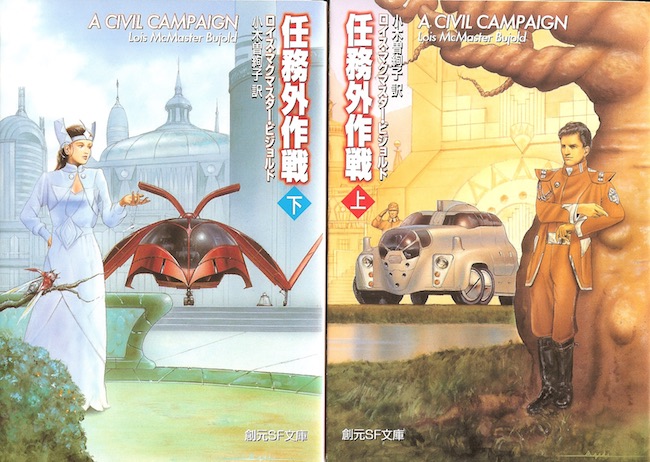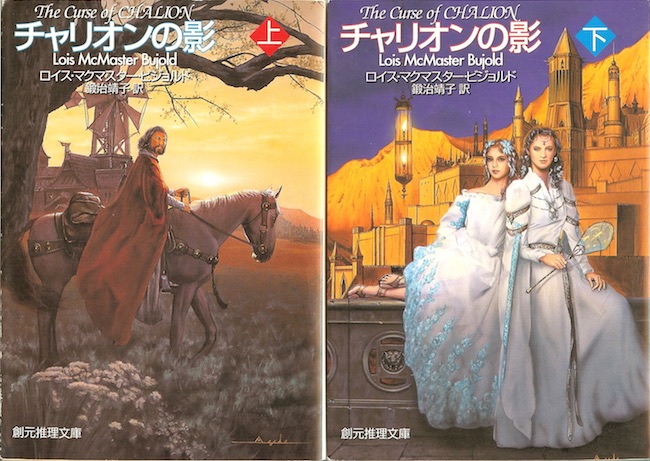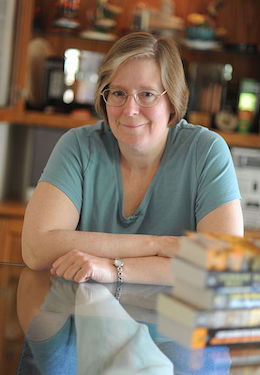When I first started discussing the Vorkosigan reread with Tor.com editor Bridget McGovern, I suggested that I could interview author Lois McMaster Bujold. I was pretty sure that was not going to fly. I thought it would be fun and interesting, and also terrifying, and that there was no way that real adults would endorse that plan, or that Lois would make time for it. She has books to write about Penric and stuff!
I had really not been paying attention, because, as I would shortly discover, Lois spends a lot of time with fans. She reads the reread! I only spent one afternoon hyperventilating into a paper bag over that (it was the afternoon she commented on “Aftermaths”). She has been incredibly generous with her time and thoughts in the comments. Because she is so generous with her time, Lois has been interviewed a lot, including by Jo Walton here on Tor.com. If you’re looking for a question I didn’t ask, check out her earlier interviews!
ECM: You published a Star Trek fanzine in the 1960s, while the series was still on the air. It’s the fiftieth anniversary of Star Trek, so I can’t resist asking you about it. What was it like to be a fan writer in the 1960s?
LMB: It was a lonelier enterprise back then than it is now. I go into it a little in this recent interview.
Other than that, I expect it was like being a newbie writer at any time, all those pictures and feelings churning around in one’s head and latching on to whatever models one could find to try to figure out how to get them down on a page. Besides the professional fiction I was reading, my models included Devra Langsam’s very early ST fanzine Spockanalia, and Columbus, Ohio fan John Ayotte’s general zine Kallikanzaros. It was John who guided Lillian and me through the mechanics of producing a zine, everything from how to type stencils (ah, the smell of Corflu in the morning! and afternoon, and late into the night), where to go to get electrostencils produced, how to run off and collate the pages—John lent us the use of his mimeograph machine in his parents’ basement. (And I just now had to look up the name of that technology on the internet—I had forgotten and all I could think of was “ditto”, a predecessor which had a different smell entirely.)
Fan writing, at the time, was assumed to be writing more about SF and fandom, what people would use blogs to do today, than writing fanfiction. So an all-fiction zine seemed a novelty to some of our fellow fans in Columbus.
ECM: The books in the Vorkosigan series have had an amazing and wildly diverse collection of book covers. What’s your favorite one?
LMB: The original Baen dust jacket for Memory remains high on my list. (But then, I’m partial to blue.) In a very different style, some of my Japanese covers have been quite fine; the A Civil Campaign and The Curse of Chalion pairs stand out. (Paperback books there are often divided into two small volumes, so they get two pieces of art.)


ECM: Miles Vorkosigan is an amazingly resilient kid (and then an amazingly resilient adult), but it sometimes seems like moving to Escobar or Beta Colony, or staying with the Dendarii, would make his life much easier. His attachment to his home planet is a little mysterious. What are Miles’s favorite things about Barrayar?
LMB: I actually put off this question for last, as it was strangely hard to answer. (I may be overthinking it.) Partly it’s that it requires me to reboot a character I haven’t written in some years, and hold his whole 43-years-book-time character development in my head at once. Why does anyone love their childhood home, or their family, if they do? (Not a universal given among F&SF readers, I observe; it’s a very anti-domestic genre. Don Sakers’s Analog review of Gentleman Jole and the Red Queen touched on this.)
Miles’s favorite place on Barrayar is easy to tag: the lakeside retreat at Vorkosigan Surleau, and the wild Dendarii mountain range backing up behind it. Actually including its obstreperous people. As ever, Miles is a conflicted hybrid, half city boy and half country, half Betan and half Barrayaran, half future and half past, stretched between in a moving present. Family, friends, landscapes; all made him and all hold him. And from his very beginning, with all those painful medical treatments as a barely comprehending child, he’s been taught that he can’t run away when things get hard. But which also taught him that painful things can get better. It’s a lesson he’s taken to heart, and not only because it validates his own questioned and criticized existence.
(Miles being Miles, he may also take this a step too far, and confuse pain with hope, which would make him not at all the first human to stray down such a path.)
ECM.: There’s been some speculation in the comments on the reread about what the worlds in the Vorkosigan series are like and how their governments work. If you had to live on one of the worlds you have created in the Vorkosigan series, which one would you choose, and why?
LMB: Nowadays, I’d want one that could effectively treat all the ills of my aging, starting with my eyes. This would actually be most of them, even Barrayar in its less-backcountry parts. After that, I would want an outdoors, with breatheable air, and space one could move to and get away from stacks of one’s fellow humans. (I am not an urban kind of girl.) So Beta Colony and Komarr would be off my list, and all the space stations. And Kaibou Danai and Mars and Jackson’s Whole, though there are lots of other good reasons not to want to live on the latter. Earth’s too crowded. I hear Tau Ceti’s pretty nice, and Escobar. I’m not sure how ordinary proles like me would fare in the Cetagandan empire. It would probably be all right in my lifetime, but when are the haut going to decide ordinary humans are biological clutter, and clean house? So, taking all in all, I think I’d vote with Cordelia’s feet and choose sunny Sergyar. (Or at least one of the sunnier parts of Sergyar.)
ECM: When and how did you decide (or realize) that Jole and Aral were lovers?
LMB: “Decide” is probably too strong a word, but the possible development existed in my mind pretty much from the moment Jole walked onstage for the first time in The Vor Game, back when I was writing it in 1989. It rode along as a potential in what I called “Schrödinger’s Cat Carrier” for many years thereafter. In the 90s, the Vorkosigan books were about other things, and in the 00s, I was mostly writing the fantasy for HarperCollins. So it wasn’t till I came back to the series with Cryoburn that the cat really started meowing to be let out. Jole’s appearance in that story is so small—four words in the epilogue—but so very significant, and no one knew it but me. Seemed unfair.
ECM: One of the things that has become very apparent in the comments on the Tor.com reread is that many of Miles’s fans are working with very personal interpretations of his story. What fan interpretation of the series has surprised you the most?
LMB: One that continues to baffle me is the indefatigable enthusiasm of some fans for explaining to others that Barrayaran neo-feudalism is a terrible system of government, as if their fellow readers couldn’t figure that out for themselves. It seems to rest on an a-historical understanding, or simply a lack of understanding, of feudalism, a system that died out in our world five hundred years ago, to be replaced by geographically based national states. (Well, four hundred years ago, in Japan.) From the passion these readers bring to the table, one would gather they imagine insidious card-carrying Feudalists are dire threat to the lifeblood of our nation. I’m not sure I should tell them about the SCA.
Portrayal is not promulgation, people.
That said, I’ve spent thirty years learning that no writer, be they ever so clear and plain, can control how readers read, or misread, their texts. Reading is a dance, not a march. If some readers step on one’s feet, well, it’s still better than sitting by the wall. …Usually.
To counteract the *headdesk* moments (which I would suffer fewer of if I would just stop reading online reviews, so I count those as self-inflicted wounds) there are those occasional letters that thank me for providing the fiction that formed someone’s lifeline in some very personal dark night of the soul. All kinds of people find this in all kinds of art, so my work is by no means unique in providing this refuge, but I’m glad it can sometimes serve. It seems to me far more important than any passing political argument.
Ellen Cheeseman-Meyer teaches history and reads a lot.











I’ve always enjoyed her books, but when I found out (back in the early days of the internet) how much Lois interacts with her fans it made her one of my favorite authors. These are great questions, and it’s always fun to get the author’s view from outside the story. Thanks!.
I think this explains a lot about Memory and A Civil Campaign. He would be the kind of guy to go “this is agonizing, I must be doing something right!”
ETA: It’s quite awesome to have her respond to your comments over on Baen’s Bar. Even if half the time it’s to remind you that further exploration of Barrayaran politics and social development is the proper realm of fan fiction. Thankfully, she crushes hopes with one hand and writes amazing new stories with the other.
Very happy about the interview. Thanks.
Thanks for this, and I very much like the inclusion of the different covers. Lois has been very kind to fans whenever I have seen her, and her new books are always an occasion for me to drop everything for a few blissful days.
I’m really loving the Japanese covers. Now I want to go look them all up.
I’m not sure if that’s supposed to be Ekaterin in the white ensemble up there, but I do like the sleek look to the long skirts and short bolero. Not so sure what’s going on with her hat, though.
Anyway, this was a nice chat with Lois, whom I have loved since I discovered the mailing list, lo those many years ago. I hold hope that Escobar is some fabulous agglomeration of cultures that would make it a great place to live.
@5 That’s easy enough (the Japanese covers are all really nice, to be sure.) – go to http://vorkosigan.wikia.com/wiki/Translations_-_Japanese and they’re all together. In a few weeks, they’ll probably also be up on the isfdb (big science fiction and fantasy database) site, but no promises….
Thanks for this! I love Miles so much, I have to reread the whole Verse ever year or so.
Bujold has created some of my best friends, and provided much human insight.
I so wish there were more!
Reading is a dance, not a march. What a wonderful summing-up! I wonder whether more people would read for fun if reading were taught on that principle, instead of on something like the pain-is-hope approach that Lois hopes Miles will avoid.
NB: the link to Sakers’s review doesn’t work. (It’s not paywalled, it just gets not-found.)
chip137,
I found Don Sakers’ review on the wayback machine/internet archive – – https://web.archive.org/web/20161123211302/https://www.analogsf.com/2016_06/reflib.shtml
Kathleen
I’ll forward the link to Devra Langsam, so she can get her egoboo.
I think I fixed the link – please, someone let me know if I accidentally broke it more!
Thank you for the interview!
Lois, you are one of my favorite authors, and I can’t tell you how many times I’ve read and re-read the Vor saga books.
Thank you for being so accessible to your fans, and being generous with your time in interviews and online interactions. Ever since I realized that we were at Ohio State together, and yet didn’t apparently know one another in the vastness of 40,000 undergrads, I’ve wondered how you fared with the English department there. Evidently, a lot better than I. – D
Thanks so much both Ellen and Lois for this interview. I ADORE those Japanese covers. I love the way they’ve made Barrayar look retrofuturistic. Damn, that is not at all how I pictured Barrayar, but now I WANT to. I will have to look up more of those covers.
And I think the Vorkosigan books are more likely than many others to help with dark nights of the soul. I don’t have a specific story about that, but I discovered the series after I became disabled and find them extremely comforting. It’s probably the series I’ve reread the most number of times in the shortest period.
David @@@@@ 13 —
The English department per se was no help at all, but a grad student fan, Lloyd Kropp, ran a writers’ group subsidiary to COSFS for a while, which was my first experience with that sort of self-help system. It didn’t get me going right away, though. I had to go away and get more life experience and digest and grow up (and read a lot) for about a decade first. But it did make writers’ groups seem a known resource when I was trying to boot up in the later isolation of stay-at-home momness.
I found one in Marion, very ill-fitting (older ladies who wanted to write poetry and such), but I read the poor things a lot of my early SF in sheer determination anyway; later, I found a better group centered out of Columbus that I drove to for a while, as I could. The most helpful over time was the long-running exchange-by-mail with Pat Wrede and Lillian Carl, though.
And then the internet happened, and my crit circle moved on-line free of geographic barriers or time delays. Brave new world.
Ta, L.
I’ve always cherished the Vorkocosigan books. She really knows how to write characters and her world development is wonderful. I love how she plays with the intersection between scientific advances and their social implications. I also love her wonderful “Ethan of Athos” as an early and fascinating examination of an all gay male world.
A Civil Campaign is one of the very few books I have ever read that has made me both laugh and cry. To this day it is up there with books like Dune and The Moon is a Harsh Mistress as one of my utterly favoured, happily recommended books, particularly if someone is into science fiction.
I have enjoyed most of Lois’ work, although I have struggled with some of her fantasy and some of her science fiction are better than others. There are so many highlights though that Lois has been a treasured author for me for three decades. I look forward to more!